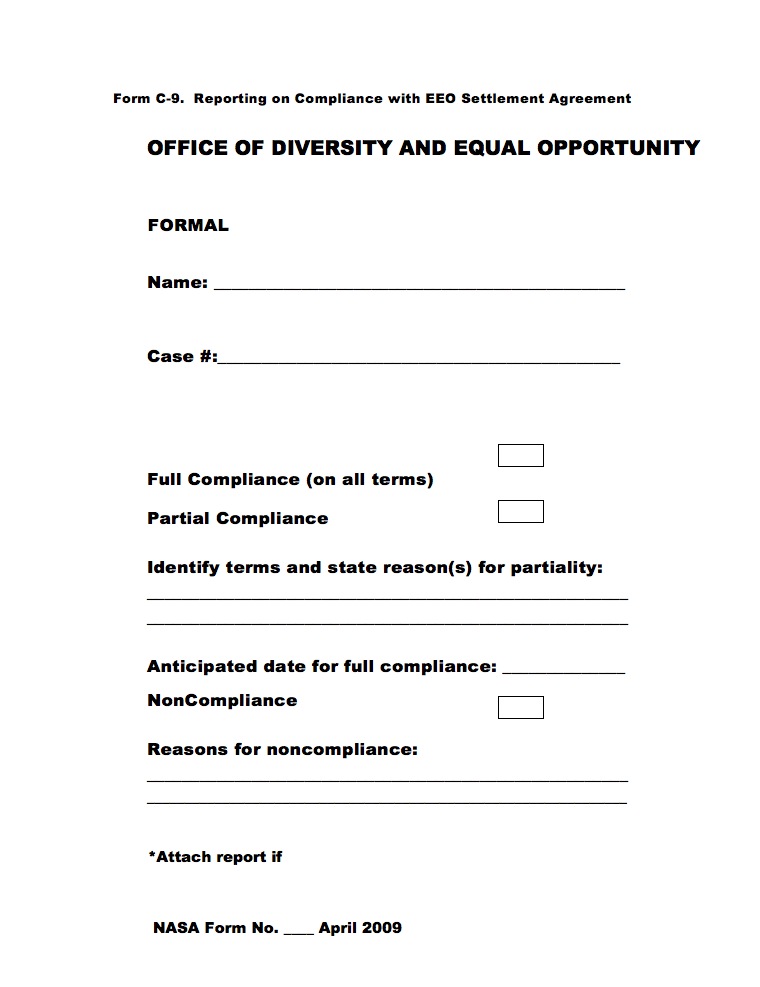![[NASA Logo]](../Images/nasaball.gif)
![[NASA Logo]](../Images/nasaball.gif) |
NASA Procedures and Guidelines |
This Document is Obsolete and Is No Longer Used.
|
|
P.1 Purpose
P.2 Applicability
P.3 Authority
P.4 Applicable Documents
P.5 Measurement/Verification
P.6 Cancellation
This NASA Procedural Requirements (NPR) applies to Alternative Dispute Resolution (ADR) program activities in the Equal Employment Opportunity (EEO) context. The NPR establishes procedures and operating principles for Agency-wide EEO ADR activities. These procedures also are intended to ensure EEOC regulatory requirements and NASA policy directives are met and to provide for consistency across NASA Centers. These procedures are not intended to establish any rights to administrative or judicial review or to establish a remedy for any NASA employee, applicant for employment, or other person separate from existing rights under Federal laws and EEOC regulations.
This NPR is applicable to NASA Headquarters and Centers, including Component Facilities.
a. Administrative Dispute Resolution Act of 1996, as amended, 5 U.S.C. § 571 et seq.
b. Federal Sector Equal Employment Opportunity, 29 C.F.R. Part 1614.
c. NPD 3713.6P, Delegation of Authority to Act in Matters Pertaining to Discrimination Complaints Under 29 C.F.R. Part 1614.
d. NPD 2010.2C, Alternative Dispute Resolution (ADR).
a. Title VII of the Civil Rights Act of 1964, as amended, 42 U.S.C. § 2000e-16 et seq.
b. Age Discrimination in Employment Act of 1967, as amended, 29 U.S.C. § 621 et seq.
c. Rehabilitation Act of 1973, as amended, 29 U.S.C. § 791 et seq.
d. Equal Pay Act of 1963, as amended, 29 U.S.C. § 206(d).
e. Older Worker's Benefit Protection Act of 1990, 29 U.S.C. § 621.
f. Civil Rights Act of 1991, 42 U.S.C. § 1981a.
g. NPD 3713.8A, Provision of Reasonable Accommodation for Individuals with Disabilities.
h. NPR 3713.1A, Reasonable Accommodations Procedures.
i. U.S. Equal Employment Opportunity Commission (EEOC) Management Directive (MD) 110.
j. EEOC MD 715.
a. Centers shall submit Center EEO ADR procedures along with any related informational materials to the Office of Diversity and Equal Opportunity (ODEO) for concurrence within 90 days of the effective date of this NPR (see also Sec. 1.4.2 below).
b. Centers, in cooperation with ODEO, shall periodically evaluate the operations and success of their EEO ADR program and engage in periodic data-gathering and other evaluation activities, including submitting ADR activity information for annual reporting to the U.S. Equal Employment Opportunity Commission (EEOC).
c. Centers shall distribute the "Evaluation Form" (see Appendix C, Form C.1) and the "Mediator's Evaluation Form" (see Appendix C, C.2) and collect these forms from each user of the mediation process who voluntarily chooses to complete these forms. If a mediation participant refuses to complete the evaluation, the Center should document the decision and reasons given, if any.
d. Centers shall update the NASA Agency-wide complaints tracking system at the conclusion of each mediation. ODEO shall use this data to monitor trends and determine the extent to which EEO ADR assists in resolving disputes.
None.
/S/
Thomas Luedtke
Associate Administrator for
Institutions and Management
1.1.1 The Assistant Administrator (AA) for Diversity and Equal Opportunity (EO) has the authority to develop and administer effective and efficient Equal Employment Opportunity (EEO) Alternative Dispute Resolution (ADR) programs and procedures consistent with existing laws, regulations, Agency directives, and guidance.
1.1.2 Under NASA's policy pertaining to discrimination complaints, the AA for Diversity and Equal Opportunity is responsible for:
a. The administration of an effective and efficient discrimination complaint program and ADR procedures regarding EEO matters; and
b. Oversight of the informal ("pre-complaint") stage of the discrimination complaint program and direct responsibility for the formal complaint process.
1.1.3 The Office of Diversity and Equal Opportunity (ODEO) shall be responsible for ensuring that there is an EEO ADR process in place at each Center and shall exercise oversight over the Agency and Center EEO ADR procedures.
1.1.4 The AA for ODEO shall designate the Director, Complaints Management Division to oversee the operation of the EEO ADR process.
1.2.1 The Director, Complaints Management Division shall:
a. Provide oversight of the day-to-day operations of the EEO ADR process; and
b. Appoint and supervise the Agency ADR Program Manager.
1.3.1 The Agency ADR Program Manager shall be appointed by and reports to the Director, Complaints Management Division, ODEO.
1.3.2 The ADR Program Manager shall administer the Agency's EEO ADR program. In this regard the ADR Program Manager shall:
a. Provide policy and operational guidance for the Center ADR Programs;
b. Develop training and provide technical assistance to the Centers; and
c. Provide informational materials on EEO ADR for dissemination Agency wide.
1.3.3 The ADR Program Manager shall be responsible for the day-to-day operation of the EEO ADR formal process. In this regard the ADR Program Manager shall:
a. Consult and coordinate with Centers regarding the determination of whether to offer mediation at the formal stage of the EEO complaints process;
b. Arrange for mediation at the formal stage of the process, including identifying a mediator, providing the mediator with the names of the parties to determine whether there is a potential or actual conflict of interest, contacting all the parties to the mediation and providing them with the name of the mediator(s), and providing the mediator with all pertinent documents needed to conduct the mediation; and
c. Determine, in consultation with the Center ADR Manager and the mediator, whether mediation should be terminated by either party, for example, where there is unreasonable delay or other evidence of lack of good faith on the part of either party.
1.4.1 The Center Director shall be responsible for ensuring the effective functioning of the EEO ADR program at the informal stage of the discrimination complaint process and for ensuring appropriate coordination with ODEO at the informal and formal stages. The Center Director or designee shall:
a. Ensure that the procedures set forth in this NPR pertaining to EEO ADR at the Center level are carried out;
b. Designate a responsible official (Center EEO ADR Manager) for the Center EEO ADR program;
c. Receive regular reports from the responsible official on the functioning of the Center EEO ADR process; and
d. Decide to institute an EEO ADR Management Team based on information provided (see Sec. 1.7, below).
1.4.2 Each Center shall be required to submit Center EEO ADR procedures along with any related informational materials to ODEO for concurrence within 90 days of the effective date of this NPR, consistent with P.5(a), Verification/Measurement, above. Any future modifications to the procedures shall also be submitted to ODEO for concurrence prior to implementation.
1.5.1 NASA Center EO Directors1 (EO Directors) shall:
a. Ensure the fair and efficient functioning of the informal EEO complaints process in cooperation and coordination with ODEO and the Center Director;
b. Manage and direct the informal complaint process and advise employees about all aspects of the EEO process, including ADR; and
c. Identify cases appropriate for mediation in consultation with Center EEO ADR Management Teams where they exist, or where they do not exist, in consultation with appropriate officials, such as the Chief Counsel or designee(s).
1.6.1 The Center EEO ADR Manager (ADR Manager) shall be appointed by the Center Director. If a Center Director appoints an EO Director to this role, the EO Director shall serve as the ADR Manager or shall delegate the day-to-day functions.
1.6.2 The ADR Manager shall:
a. Work closely with Center management and the Center's EEO Office to administer the Center's EEO ADR process, including carrying out specific roles and responsibilities pertaining to EEO ADR at the informal and formal stages of the EEO complaints process as identified in this NPR (Chapters 2, 3, and 4);
b. Identify cases appropriate for mediation in consultation with the Center EO Director, Center EEO ADR Management Teams if they exist, or in consultation with appropriate officials, such as the Chief Counsel or designee(s);
c. Arrange for mediation at the informal stage of the process, consistent with this NPR, Chapter 3;
d. Develop EEO ADR procedures for the informal stage of the discrimination complaint process that are consistent with Agency-wide EEO ADR policy, as well as the needs of the particular Center;
e. Develop or utilize existing NASA communications materials to promote and advocate the use of the EEO ADR process to resolve disputes;
f. Verify that Center managers, supervisors, and employees, as necessary, are appropriately trained on the Agency and Center EEO ADR procedures, including periodic training in ADR for Center employees likely to be involved in EEO ADR or dispute-related activities (such as EEO personnel, Human Capital/Human Resources personnel, EEO ADR Team members, Chief Counsel or General Counsel personnel, and managers who may serve as management or resolving officials in disputes);
g. Coordinate with the Complaints Management Division, ODEO in its administration of the EEO ADR process at the informal and formal stage of the discrimination complaints process (see Chapters 2 and 4);
h. Report annually on the Center EEO ADR process to the AA for ODEO in accordance with Preface P.5 of this NPR (Verification/Measurement);
i. Utilize forms contained in Appendix B to ensure consistency in the ADR process; and
j. Explore the need for an EEO ADR Management Team to facilitate the process and report findings to the Center Director. To the extent an EEO ADR Management Team is used, the Center ADR Manager will serve as team lead. EEO ADR Management Teams are encouraged but not mandatory.
1.7.1 If an EEO ADR Management Team is established at a Center, it shall be comprised of representatives of the Center's Equal Opportunity (EO) Office, the Office of the General Counsel or the Office of the Chief Counsel, and the Human Resources Office. Other Center officials may be represented on the EEO ADR Team as deemed appropriate.
1.7.2 The EEO ADR Team shall:
a. Meet regularly to engage in open discussions regarding the nature of existing EEO complaints and the most effective ADR methodology to address specific situations;
b. Assist in the identification of Management representative and settlement officials;
c. Assist the EO Director and/or ADR Manager in identifying cases appropriate for mediation;
d. Serve in an advisory role to management regarding problems identified in an organization; and
e. Explore resolution options dealing with potential or actual disputes of an individual or organizational nature.
1.8.1 The Management representative shall be selected by the Center Director or his/her designee.
1.8.2 The Management representative shall have authority and responsibility to negotiate in good faith and shall have the option of discontinuing ADR after consultation with or on behalf of management, if the representative determines that no option for resolution acceptable to NASA can be developed.
1.8.3 The Management representative shall be, or shall have immediate access to, a person delegated with authority to approve or enter into a settlement agreement binding on the Center and Agency (see also "Settlement Official," Sec. 1.9, below). Hence, the Management representative and the Settlement Official may be the same individual.
1.8.4 However, no responsible management official or agency official directly involved in the case shall serve as the person with settlement authority, i.e., where the responsible management official is serving as the Management representative he/she shall not also serve as the Settlement Official.
1.8.5 In addition, where the aggrieved individual or Complainant so requests, the Management representative shall not be the responsible management official, i.e., the Agency official who has been identified as allegedly being responsible for the matters raised by the aggrieved individual (informal stage) or Complainant (formal stage).2
1.9.1 The Settlement Official shall be selected by the Center Director or his/her designee.
1.9.2 Each Center shall designate a Settlement Official in advance of mediation or have a standing Settlement Official.
1.9.3 The Settlement Official shall be a senior Agency representative who has been delegated authority to enter into an agreement that is binding on the Center and Agency.
1.9.4 While the Settlement Official may be the Management representative, consistent with Section 1.8.3 above, no responsible management official or Agency official directly involved in the case shall serve as the person with settlement authority. Therefore, where the Management representative is the responsible management official, the Management representative shall not act as the Settlement Official. Nor shall the Settlement Official be the EO Director.
1.10.1 The Administrative Dispute Resolution Act (ADRA) of 1996 defines a neutral as "an individual who, with respect to an issue in controversy, functions specifically to aid the parties in resolving the controversy." (For purposes of this NPR, the terms "neutral" and "mediator" are synonymous).
1.10.2 As a matter of policy, it is highly encouraged that the Agency ADR Program Manager or Center EEO ADR Managers obtain neutrals from sources external to the Center where the dispute arose, e.g., Shared Neutral Program, other agencies, contract mediators, or similar sources. However, EEO personnel shall not serve as neutrals/mediators.
1.10.3 Each neutral used by NASA shall have been thoroughly trained and shall be well experienced. See EEOC MD-110, Section IV (B), which discusses qualifications of neutrals. Upon request, parties shall be provided with information on the neutral that the Center selects for services in a given matter, and parties shall have the right to request a different neutral, for example, where there is a concern raised regarding conflict of interest.
2.1.1 ADR is any procedure used to resolve issues in controversy, including, but not limited to, conciliation, facilitation, mediation, fact-finding, mini-trials, arbitration, and use of ombudspersons, or any combination thereof.
2.1.2 At NASA, the most frequently used form of ADR is mediation. Mediation is commonly used for individual disputes but also may be adapted to the needs of multiple participants with a common dispute. Mediation is a process that uses a neutral mediator, who has no decision-making authority (see this NPR, Chapter 4, Sec. 4.3). The mediator facilitates discussions between the parties to a dispute in an effort to reach a mutually acceptable resolution.
2.2.1 It is NASA policy to maintain a productive work environment in which disputes can be settled quickly by voluntary use of ADR. Utilization of EEO ADR procedures, when practicable and appropriate, help to resolve disputes at the earliest stage feasible, by the fastest and least expensive method possible, and at the lowest organizational level. EEO ADR procedures and an increased understanding of the most effective use of such procedures, are intended to enhance the operation of NASA's EEO ADR programs and better serve the workplace.
2.2.2 Consistent with this policy and applicable law, NASA shall:
a. Ensure that its EEO ADR programs operate to facilitate creative, efficient, and sensible outcomes in EEO disputes; and
b. Make maximum appropriate use of ADR to avoid EEO workplace disputes, effectively resolve conflicts when they arise, and foster positive and creative ways for NASA's workforce to deal with workplace challenges.
2.3.1 Individuals shall be informed of their opportunity to participate in ADR during EEO counseling, which occurs within the informal or precomplaint stage of the process, when ADR is deemed appropriate (see Chapter 3, Sec. 3.1). Consistent with these requirements, the EEO Counselor shall inform individuals of these rights at the precomplaint stage.
2.3.2 ODEO shall inform them of these rights at the formal complaint stage.
2.3.3 EO Directors and ODEO shall also inform individuals that participation in the Agency EEO ADR process shall not in any way diminish their rights to pursue claims under applicable laws and regulations, if ADR is unsuccessful.
2.4.1 EO Directors, ADR Managers, and ODEO shall ensure that EEO complainants (referred to as "aggrieved individuals" at the informal stage) and Management representatives knowingly and voluntarily choose to engage in ADR and may choose to withdraw from ADR at any time without prejudicing the outcome of the informal or formal complaint process.
2.4.2 No one, including a neutral, may force or coerce participation or a particular resolution for any party. Complainants also shall be informed that they may not lose their right to pursue claims if ADR does not resolve the matter, providing they continue to meet the regulatory timeframes for pursuing their complaints.
2.5.1 Pursuant to regulatory timeframes established under 29 C.F.R. Part 1614:
a. Within 30 days of the date the aggrieved person contacted the agency's EEO office to request counseling, the EEO Counselor shall conduct the final interview with the aggrieved person unless the aggrieved person agrees in writing with the agency to postpone the final interview and extend the counseling period for an additional period of no more than 60 days; and
b. The aggrieved person shall be informed in writing by the Counselor, not later than the thirtieth day after contacting the Counselor, of the right to file a discrimination complaint (unless the aggrieved person has agreed to an extension of no more than 60 days).
2.5.2 However, where the aggrieved person chooses to participate in ADR, the precomplaint processing period shall be extended for up to 90 days. If the claim has not been resolved before the 90th day, the notice of the right to file a discrimination complaint shall be issued.
2.6.1 Management's decision to participate in ADR requires managers to act in good faith to reach a mutually acceptable resolution. However, the participating Management representative shall have the option of discontinuing ADR after consultation with or on behalf of management if the representative determines that no option for resolution acceptable to NASA can be developed.
2.7.1 There are instances in which EEO ADR may not be appropriate or feasible. Accordingly, the EO Director, in consultation with appropriate management officials, shall determine whether a particular case is appropriate for EEO ADR.
2.7.2 Instances in which EEO ADR may be inappropriate include:
a. An allegation that fraud, waste, or abuse was committed by either party;
b. A case where a precedential decision is sought;
c. A case where violence is alleged;
d. Evidence that one of the parties is acting in bad faith, e.g., when one party mainly seeks delay or appears to be using the process for discovery;
e. Certain types of harassment, e.g., threatened violence, stalking;
f. Instances where the complainant has filed multiple complaints in the past in which resolution efforts have been unsuccessful; or
g. Situations where options are dictated or limited by law. (e.g., reinstating a NASA employee ? a decision to reinstate an employee where the final decision was made by another Agency such as the Office of Personnel Management or the Merit Systems Protection Board.)
2.8.1 In instances involving class actions or multi-party disputes and EEO ADR is desired and deemed appropriate, ODEO shall make arrangements for EEO ADR, in collaboration with the Center.
2.9.1 The confidentiality of mediation proceedings is required by EEOC and the ADRA of 1996 (with certain limitations discussed in Sec. 2.9.2, below). Confidentiality is critical to parties' trust and their uninhibited, good faith participation in ADR. See also App. B, º B.2, "Agreement to Mediate Form."
2.9.2 Confidentiality is a critical component of ADR. The confidentiality provisions of the ADRA of 1996, as amended, vary depending on such things as the type of ADR procedure used, the number of parties participating, and the issues involved. ADRA, 5 USC º 574. Generally, the dispute resolution communication, as defined by ADRA, 5 USC º 571(5), or any communication provided in confidence to a neutral shall not be disclosed.
2.9.3 There are exceptions to this rule where disclosure would be permitted or required by law. In order to determine whether information should be disclosed or withheld, NASA officials will seek the advice of the Office of the General Counsel or the Office of the Chief Counsel (if at a NASA Center or component facility) or the Counsel to the Inspector General (if in a matter arising in the Office of the Inspector General) before taking action to release or deny information that may be considered "confidential."
2.10.1 EO Directors or ADR Managers shall advise aggrieved individuals that they have the right to be represented during EEO ADR, providing the representative does not present a conflict of interest, but that representation is not required for participation in EEO ADR.3
2.10.2 EO Directors or ADR Managers shall ensure (or require neutrals to ensure) that representatives are informed about EEO ADR and that they understand that in EEO ADR parties are encouraged to participate fully and have the right to speak for themselves.
2.10.3 EO Directors or ADR Managers shall ensure that Management representatives are advised that they have the right to, and should consult with, the Office of the General Counsel or the Office of the Chief Counsel or the Counsel to the Inspector General (if in a matter arising in the Office of the Inspector General).
2.10.4 If an individual is represented by an attorney, the Office of the General Counsel or the Office of the Chief Counsel shall be notified by the EO Director and/or ADR Manager and will decide whether there shall be Agency legal participation in the mediation.
2.11.1 EO Directors and ADR Managers shall ensure that any party to the mediation with a disability who wishes to participate in EEO ADR is provided with a reasonable accommodation if requested. Examples:
a. A mobility-impaired person may need a mediation room that is wheelchair accessible;
b. A deaf or hard of hearing person may need a sign language interpreter or assistive device; and
c. A person taking medication for a psychiatric disability may need drinking water or frequent breaks.4
2.11.2 EO Directors or ADR Managers shall ensure that settlement agreements reached in EEO ADR take into consideration and provide for reasonable accommodations as appropriate, consistent with NASA policy and procedures on the provision of reasonable accommodation.
2.12.1 While NASA's EEO complaint process is generally unavailable to nonNASA employees, each Center shall reserve the right, at its discretion, to offer ADR in EEO cases involving non-employees and NASA employees. The EEO ADR Management Team and Office of the Chief Counsel or Office of the General Counsel shall be consulted about the use of EEO ADR under these circumstances.
3.1 The NASA Centers administer ADR programs at the informal stage of the EEO complaints process, with oversight from the Agency's Office of Diversity and Equal Opportunity. This chapter lays out the EEO ADR process at the informal stage.
3.2.1 An individual who has sought EEO counseling shall be advised by the EEO Counselor of the option to receive traditional counseling or the opportunity to participate in ADR where the agency agrees to offer ADR in a particular case;5 and
3.2.2 Center management, in consultation with the EO Director and/or the Center ADR Manager, shall determine whether the informal complaint is appropriate for mediation.
3.3.1 While mediation may be productive at any time in the course of an EO dispute, mediation shall be attempted as soon as reasonably possible after the alleged discriminatory event, once an EEO Counselor has been contacted.
3.3.2 There may be time limits imposed by external processes (formal complaint filing, limits related to the Merit Systems Protection Board, Office of Special Counsel, union grievance processes, or others). While it is primarily the responsibility of affected parties to be aware of applicable filing deadlines and procedures, the EO Director and/or ADR Manager shall take reasonable steps to alert parties to the possibility of such limits.
3.3.3 The ADR Manager shall obtain the services of neutrals from sources external to the Center where the dispute arose, e.g., Shared Neutral Program, other agencies, contract mediators, or similar sources.
3.3.4. The ADR Manager shall identify a mediator and provide the mediator with the names of the parties to determine whether there is a potential or actual conflict of interest.
3.3.5 Mediators in training shall be allowed to observe or comediate at the discretion of the ADR Manager and with the advance consent of the parties.
3.3.6 The ADR Manager shall contact all the parties in the mediation and provide them with the name of the mediator(s).
3.3.7 The parties shall have an opportunity to request another mediator if the mediator is not acceptable to either party.
3.3.8 The ADR Manager shall provide the mediator with all pertinent documents needed to conduct the mediation.
3.3.9 The mediator shall contact the ADR Manager to assist in coordinating the mediation session(s).
3.3.10 The ADR Manager shall serve as the mediator's point of contact for onsite resources and support, such as logistical arrangements and access to the Center.
3.4.1 The ADR Manager, if other than the EO Director, shall keep the EO Director apprised as to the status of the mediation process.
3.4.2 The ADR Manager shall, in consultation with the EO Director, the mediator, and management, determine whether mediation should be terminated, for example, due to unreasonable delays or other evidence of lack of good faith by either party.
3.4.3 The complainant may also terminate the mediation and return to the EEO process at any time.
3.5.1 If settlement is reached through mediation, the terms shall be reduced to writing by the mediator.
3.5.2 The Office of the General Counsel, the Office of the Chief Counsel, or the Counsel to the Inspector General shall review the agreement for legal sufficiency prior to obtaining all necessary signatures.
3.5.3 A representative of the EO Office shall also review the settlement agreement for conformance with EEO regulations and guidelines.
3.5.4 The settlement agreement shall be signed by the aggrieved individual and the settlement official. (See Appendix C.3.)
3.5.5 The Management representative shall consult with officials in the EO office, Office of the Chief Counsel, Office of the General Counsel, Counsel to the Inspector General, or Human Resources of the Human Capital Office, or other site officials, as appropriate, during the course of the settlement discussion.
3.5.6 Centers shall afford the aggrieved individual a reasonable opportunity to review the draft agreement and consult with a legal or other representatives prior to finalizing the agreement.
3.5.7 The following language shall be included in all settlement agreements:
If [insert name of aggrieved/complainant] believes that NASA has not complied with the terms of this agreement, she/he may request that the terms be specifically implemented, or alternatively, that the complaint be reinstated for further processing at the point ceased, in accordance with the procedures set forth in 29 C.F.R. §1614.504. Any such request must be made within thirty (30) calendar days of the date s/he knew or should have known of the noncompliance and must be forwarded to the DIRECTOR, COMPLAINTS MANAGEMENT DIVISION, OFFICE OF DIVERSITY AND EQUAL OPPORTUNITY, NASA HEADQUARTERS, WASHINGTON, D.C. 20546, with an explanation as to why she/he believes that the agreement has not been carried out.
3.5.8 If the complaint contains an allegation of age discrimination, the settlement agreement must contain the appropriate settlement provisions required by the Older Workers Benefit Protection Act (OWBPA). (See Appendix B.4.)
3.5.9 In the event the ADR Manager is aware of EEO complaints at other Centers by the same individual, the ADR Manager shall inform the EO Director, the Office of the General Counsel or the Office of the Chief Counsel, and the EEO ADR Management Team, where appropriate. Accordingly, Centers shall, wherever possible, seek global settlement, e.g. multiple cases involving the same aggrieved individual through the EEO ADR process.
3.5.10 The ADR Manager shall send a signed and dated copy of the settlement agreement to the EO Director and the Director, ODEO Complaints Management Division within five business days of the execution of the settlement agreement.
3.5.11 The Center EO Office shall be responsible for maintaining the original copy of the settlement agreement and for providing copies to ODEO and the Office of the General Counsel or the Office of the Chief Counsel.
3.5.12 The EO Director or the ADR Manager shall be responsible for ensuring that the terms of the ADR settlement agreement are carried out in coordination with appropriate stakeholder offices, such as the Office of the Chief Counsel and Office of Human Resources.
3.6.1 If a resolution cannot be achieved, the mediator shall end mediation and notify the ADR Manager who, in turn, shall advise the EO Director.
3.6.2 The aggrieved individual shall be referred back to the EEO counselor for a final interview and given his/her notice of a right to file a formal EEO complaint.
4.1. The Agency Office of Diversity and Equal Opportunity administers the Agency EEO ADR program and the formal stage of the EEO complaints process. This chapter lays out the EEO ADR process at the formal stage.
4.2.1 During the acceptance/dismissal stage of the complaint process, the Agency ADR Program Manager (ADR Program Manager) shall coordinate with the Center management in determining whether to offer mediation at the formal stage of the process.
4.2.2 Center management, in consultation with the EO Director and/or the Center ADR Manager (ADR Manager), shall determine whether the formal complaint is appropriate for mediation.
4.3.1. The ADR Program Manager shall identify a mediator and provide the mediator with the names of the parties to determine whether there is a potential or actual conflict of interest.
4.3.2 The ADR Program Manager shall contact all the parties to the mediation and provide them with the name of the mediator(s).
4.3.3 The parties shall have an opportunity to request another mediator if the mediator is not acceptable to either party.
4.3.4 The ADR Program Manager shall provide the mediator with all pertinent documents needed to conduct the mediation. The mediator shall contact the Center ADR Manager to assist in coordinating the mediation session(s).
4.3.5 The Center ADR Manager shall serve as the mediator's point of contact for onsite resources and support, such as logistical arrangements and access to the Center.
4.4.1 The ADR Manager, if other than the EO Director, shall keep the EO Director apprised as to the status of the mediation process.
4.4.2 The ADR Program Manager shall, in consultation with the Center ADR Manager and the mediator, determine whether mediation should be terminated due to unreasonable delays or other evidence of lack of good faith by either party.
4.4.3 The complainant may also terminate the mediation and return to the EEO process at any time.
4.5.1 If settlement is reached through mediation, the terms shall be reduced to writing.
4.5.2 The Office of the General Counsel, the Office of the Chief Counsel, or the Counsel to the Inspector General shall review the agreement for legal sufficiency prior to obtaining all necessary signatures.
4.5.3 The settlement agreement shall be signed by the complainant and the settlement official. (See Appendix C.3.)
4.5.4 The Management representative shall consult with officials in the Center EO office, the Office of the General Counsel, the Office of the Chief Counsel, the Counsel to the Inspector General, Human Resources or Human Capital Offices, or other site officials, as appropriate, during the course of the settlement discussion.
4.5.5 The Center ADR Manager shall send a signed and dated copy of the settlement agreement to the Director, Complaints Management Division, ODEO and the EO Director within five business days of the execution of the settlement agreement.
4.5.6 The following language shall be included in all settlement agreements:
If [insert name of aggrieved/complainant] believes that NASA has not complied with the terms of this agreement, s/he may request that the terms be specifically implemented, or alternatively, that the complaint be reinstated for further processing at the point ceased, in accordance with the procedures set forth in 29 C.F.R. §1614.504. Any such request must be made within thirty (30) calendar days of the date s/he knew or should have known of the noncompliance and must be forwarded to the DIRECTOR, COMPLAINTS MANAGEMENT DIVISION, OFFICE OF DIVERSITY AND EQUAL OPPORTUNITY, NASA HEADQUARTERS, WASHINGTON, D.C. 20546, with an explanation as to why s/he believes that the agreement has not been carried out.
4.5.7 If the complaint contains an allegation of age discrimination, the settlement agreement must contain the appropriate settlement provisions required by the Older Workers Benefit Protection Act (OWBPA). (See Appendix C.4.)
4.6.1 If a resolution cannot be achieved, the mediator shall end mediation and notify the Center ADR Program Manager.
4.6.2 The Center ADR Manager shall advise the Agency ADR Program Manager that the mediation effort did not result in settlement.
4.6.3 The complaint shall resume through the regular complaint process at the point where processing ceased.
A.1 Aggrieved Individual — Refers to an individual who alleges a harm with respect to a term, condition, or privilege of employment at the informal stage of the EEO process.
A.2 Alternative Dispute Resolution (ADR) — A method of resolving workplace disputes without a legal determination by a court or an administrative body. At NASA, ADR will normally take the form of mediation.
A.3 Complainant — An individual who has filed a formal EEO complaint.
A.4 EEO ADR Management Team — A group of individuals to whom a Center Director has delegated authority to explore resolution options dealing with potential or actual disputes of an individual or organizational nature.
A.5 Formal Complaint Process — A regulatory procedure for addressing allegations of discrimination, which consists of: the filing of an EEO complaint; the acceptance/ dismissal of a complaint; the investigation of the accepted claim(s); and the election of either an EEOC hearing or an Agency Final Agency Decision (FAD).
A.6 Informal or PreComplaint Process — A regulatory procedure for addressing allegations of discrimination prior to the filing of a formal EEO complaint.
A.7 Management representative — A senior management official to whom the Center Director or other appropriate management official has delegated authority to engage in mediation.
A.8 Mediation — A voluntary and confidential process in which an impartial third party assists disputants in finding a mutually acceptable solution to their dispute.
A.9 Mediator — A third party neutral who facilitates discussions between parties to a dispute in an effort to reach a mutually acceptable resolution.
A.10 Neutral — An EEO ADR service provider such as a mediator, facilitator, or ombudsman.
A.11 Responsible Official — An Agency official who has been identified as allegedly being responsible for the matters raised by the Complainant.
A.12 Settlement Official — A senior Agency representative who has been delegated authority to enter into an agreement that is binding on the Center and Agency.
B.1 Administrative Dispute Resolution Act of 1996 (ADRA).
B.2 Alternative Dispute Resolution (ADR).
B.3 Equal Employment Opportunity (EEO).
B.4 Equal Employment Opportunity Commission (EEOC).
B.5 Management Directive (MD).
B.6 Older Workers' Benefits Protections Act of 1990 (OWBPA).
This Appendix includes forms related to ADR which are recommended for use at all NASA Centers. They include:
C.1 Mediation Election Form.
C.2 Agreement to Mediate.
C.3 Sample Settlement Agreement.
C.4 Required language for settlement agreements involving age discrimination.
C.5 Evaluation for party comments on experience with mediation.
C.6 Evaluation for completion by mediators.
C.7 Form for reporting on compliance with terms of Settlement Agreements.
C.8 Reporting on Compliance with EEO Settlement Agreement.
C.9 Reporting on Compliance with EEO Settlement Agreement.
Form C-1
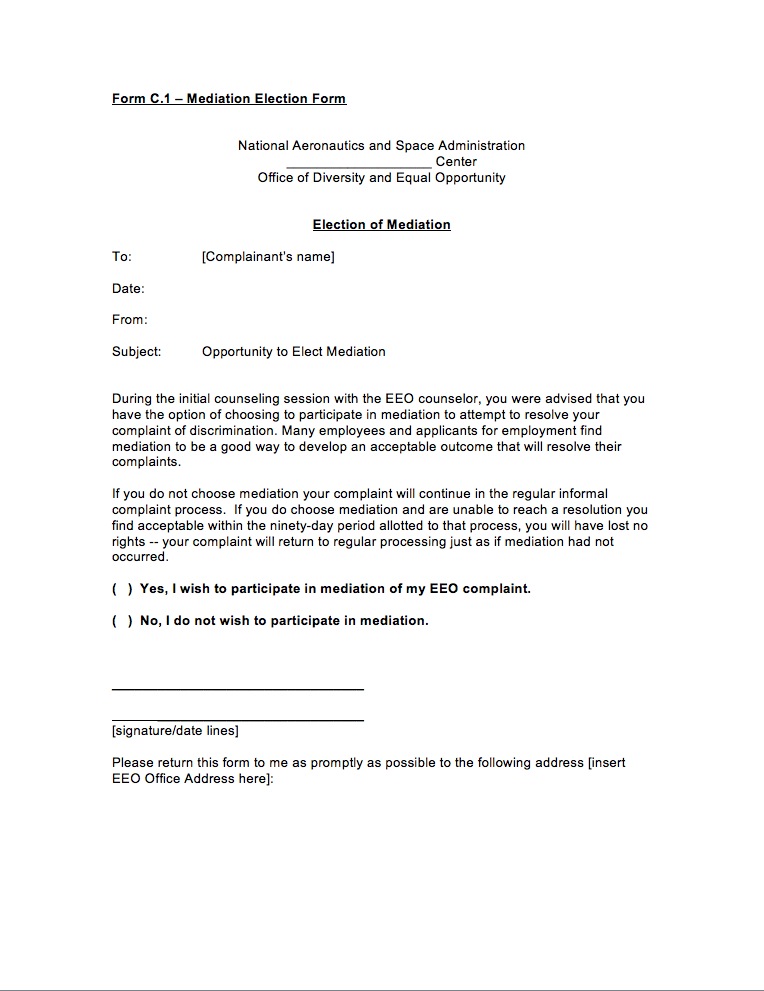
Form C-2
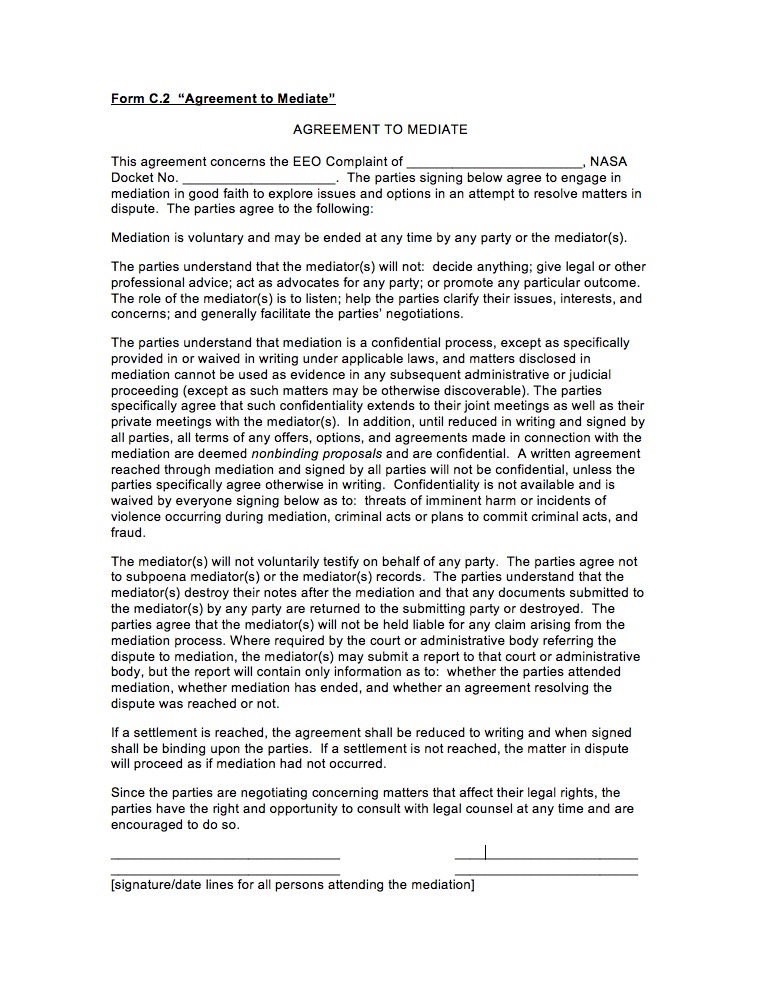
Form C-3
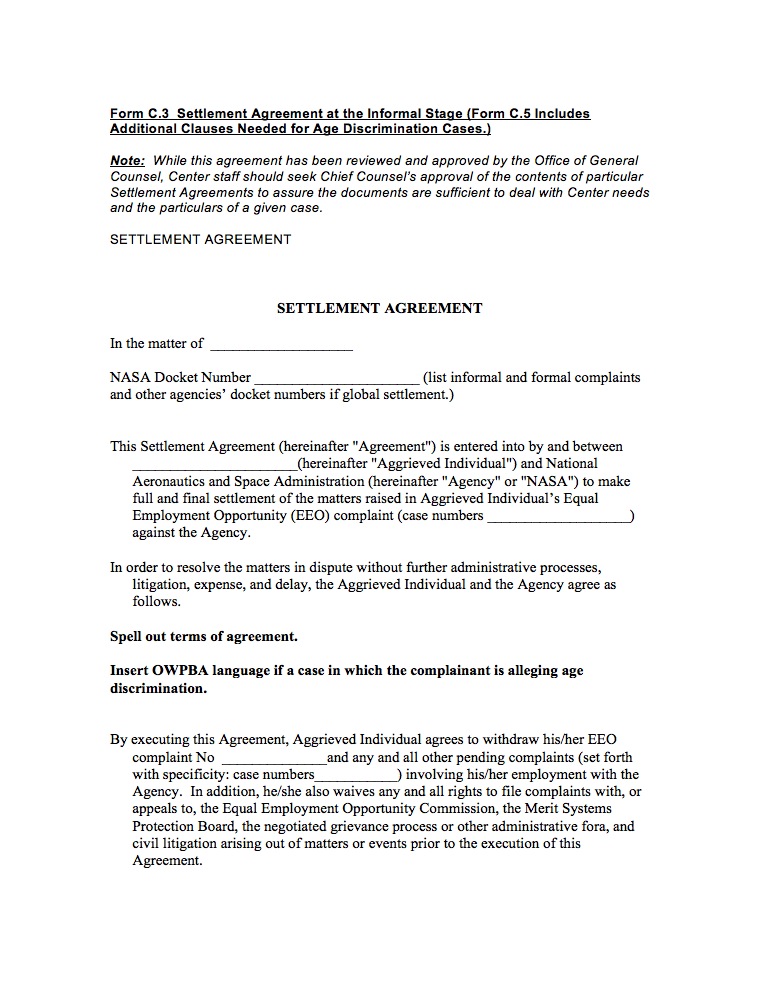
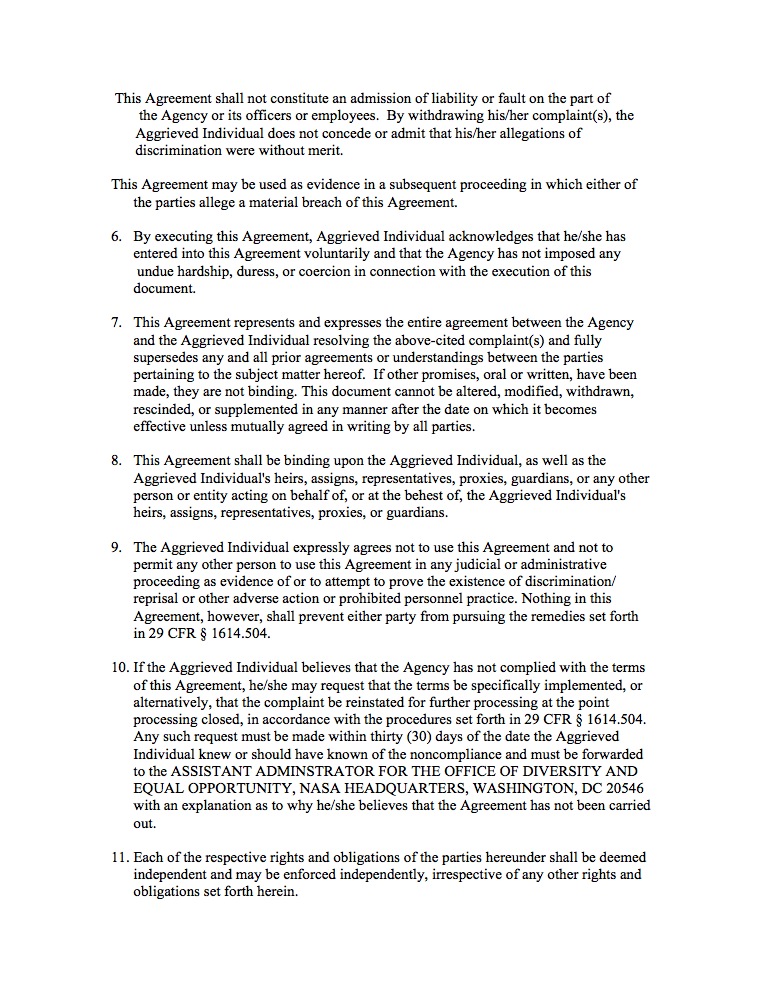
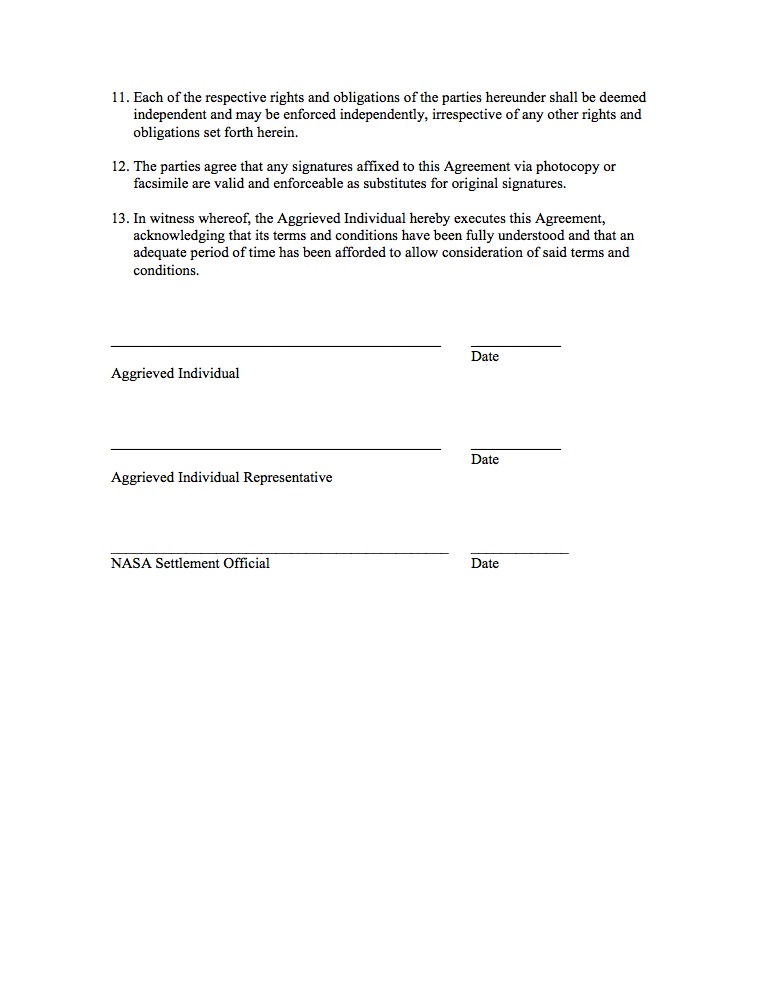
Form C-4
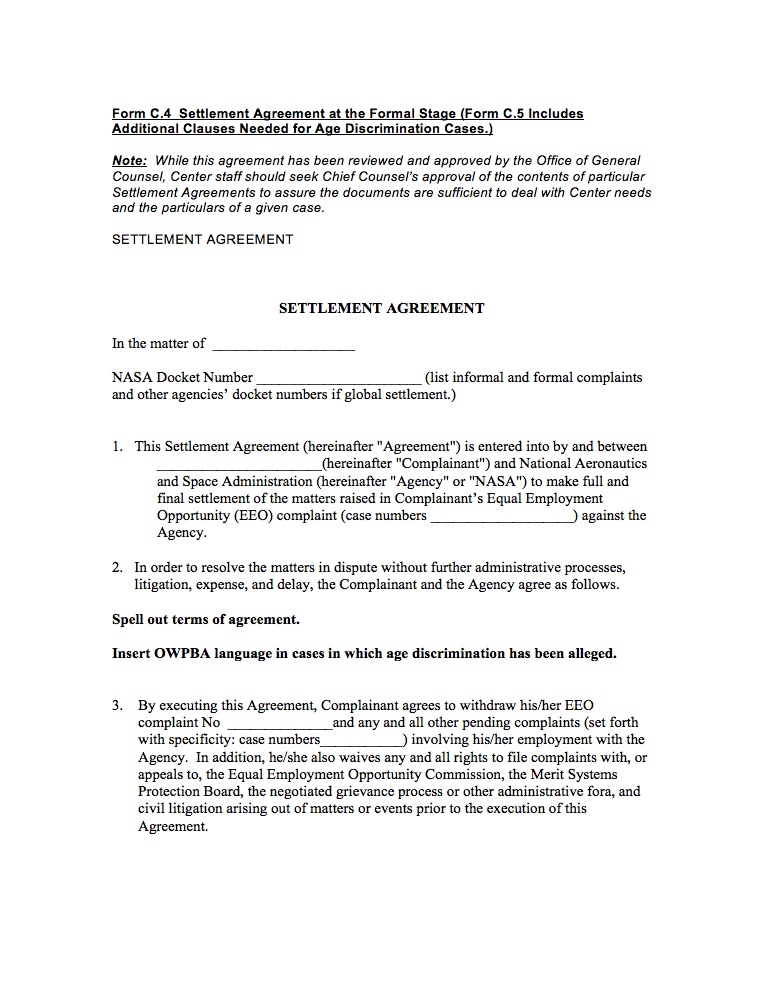
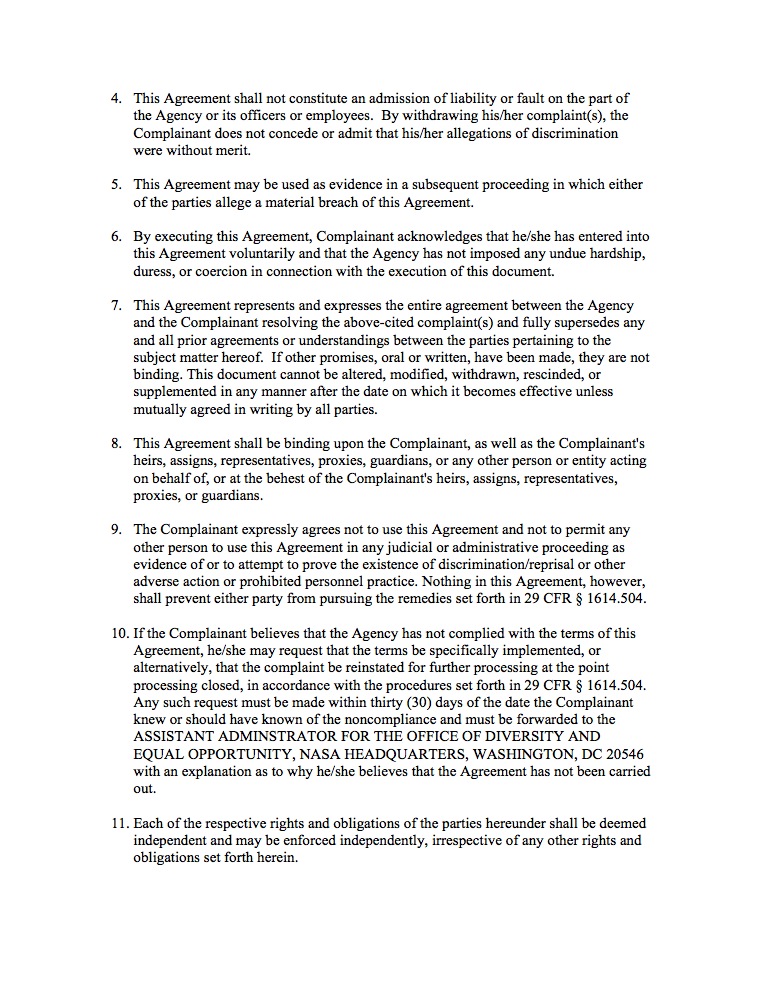
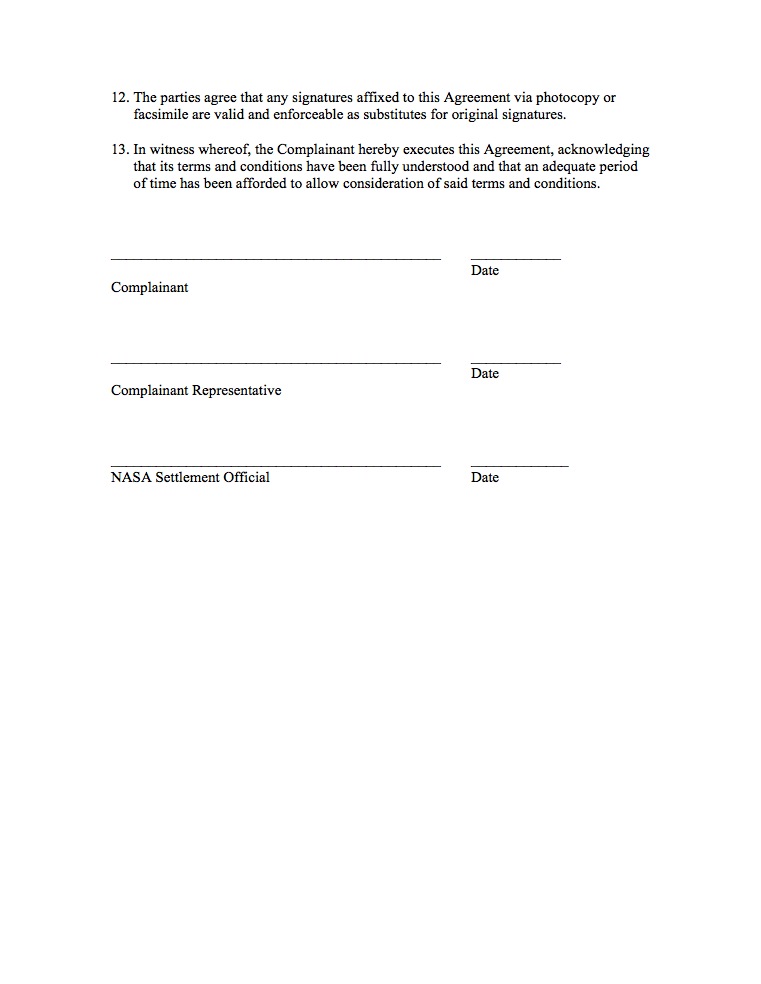
Form C-5
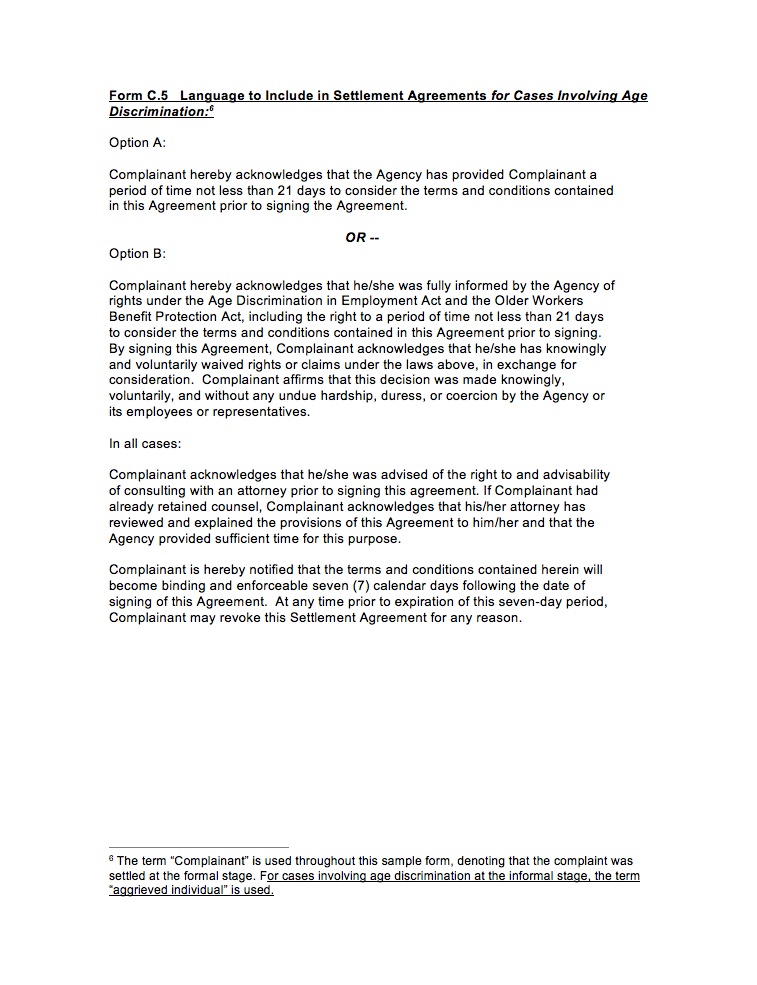
Form C-6
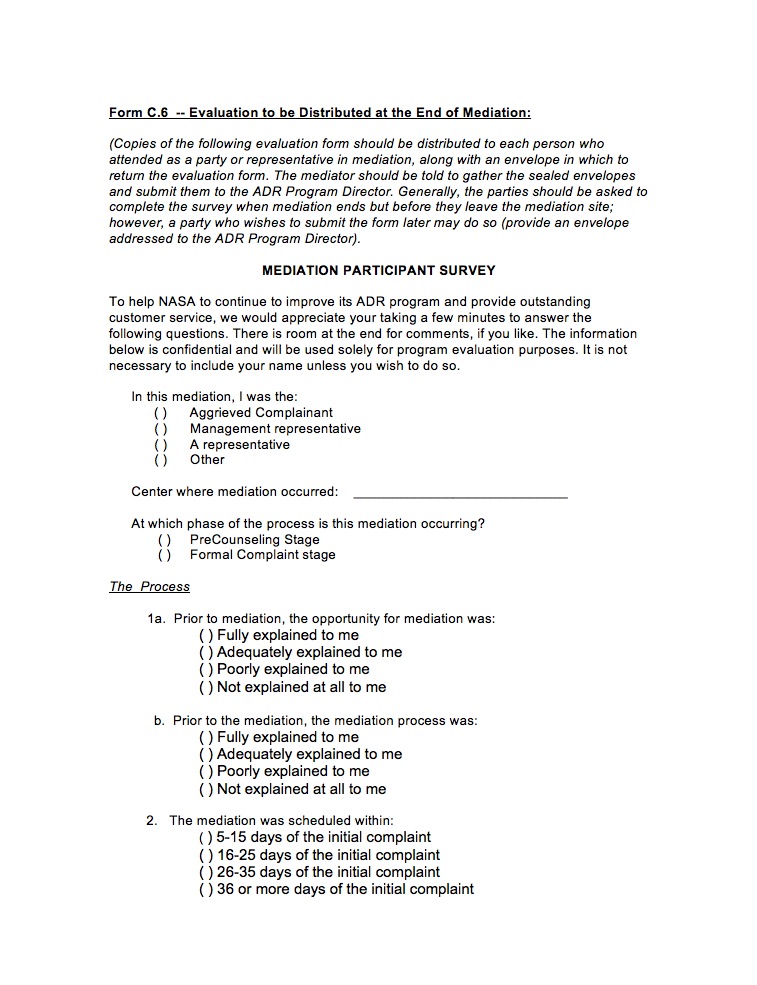
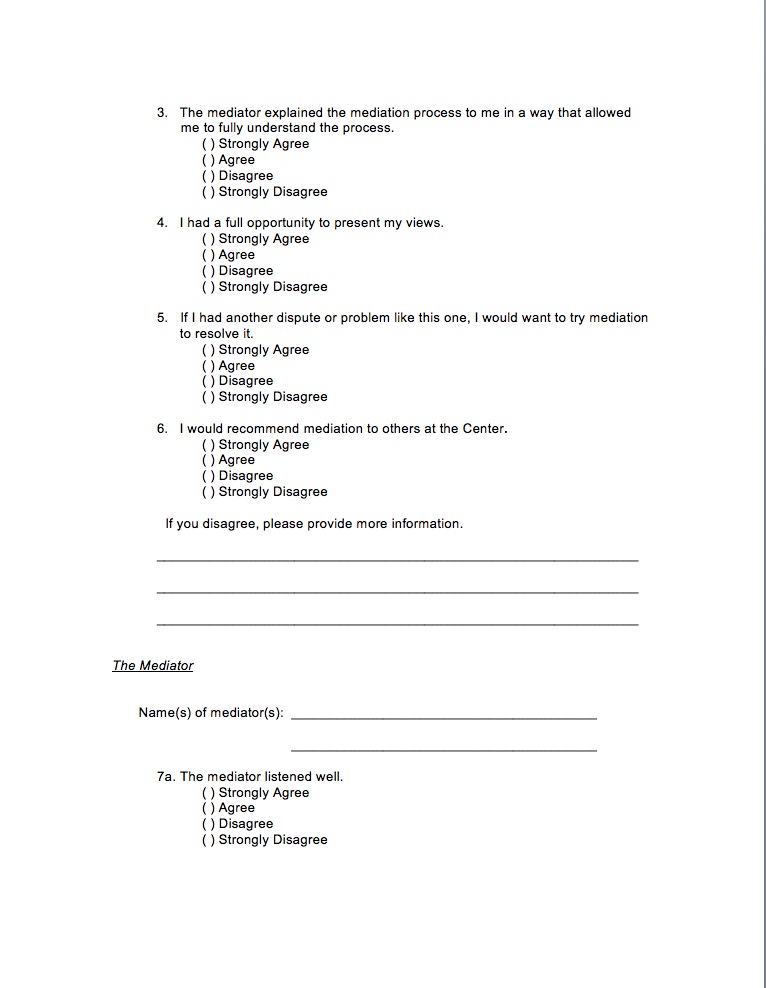
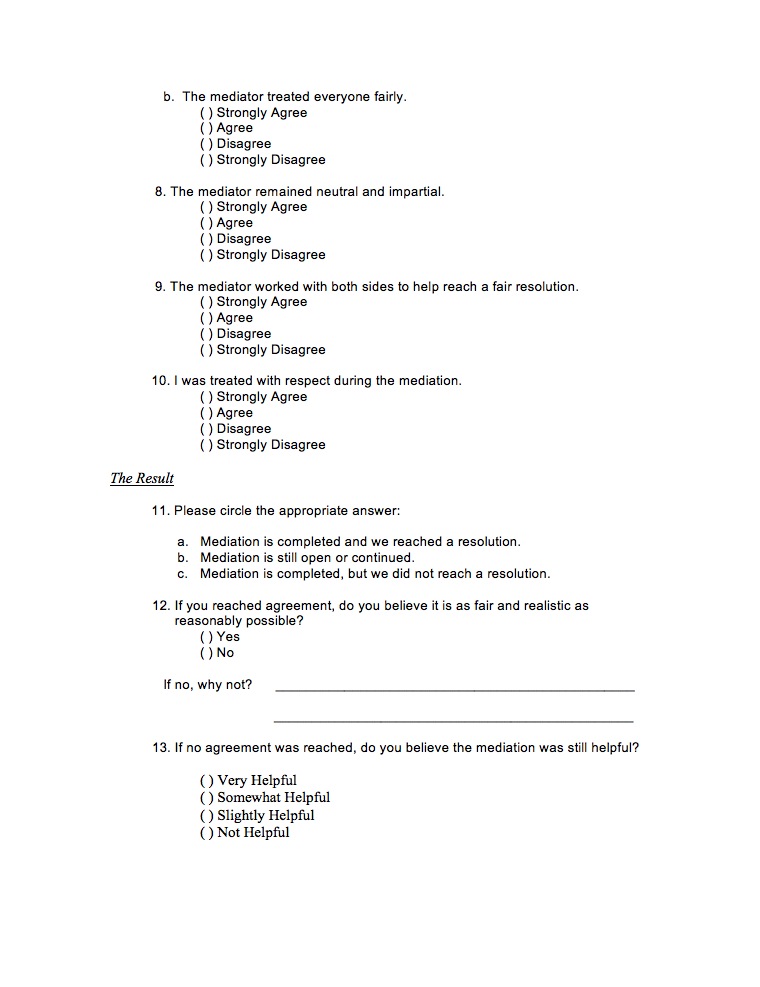
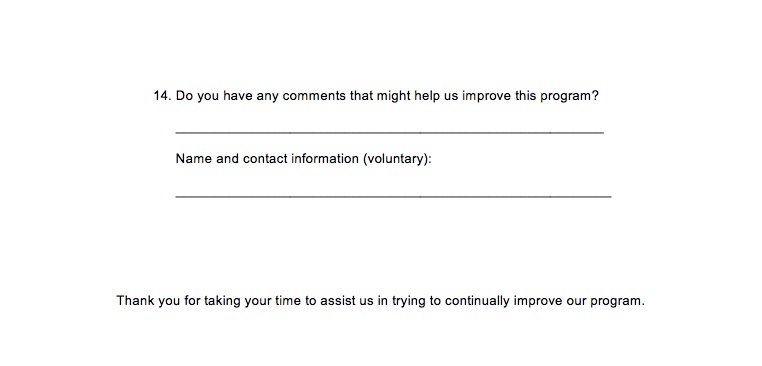
Form C-7
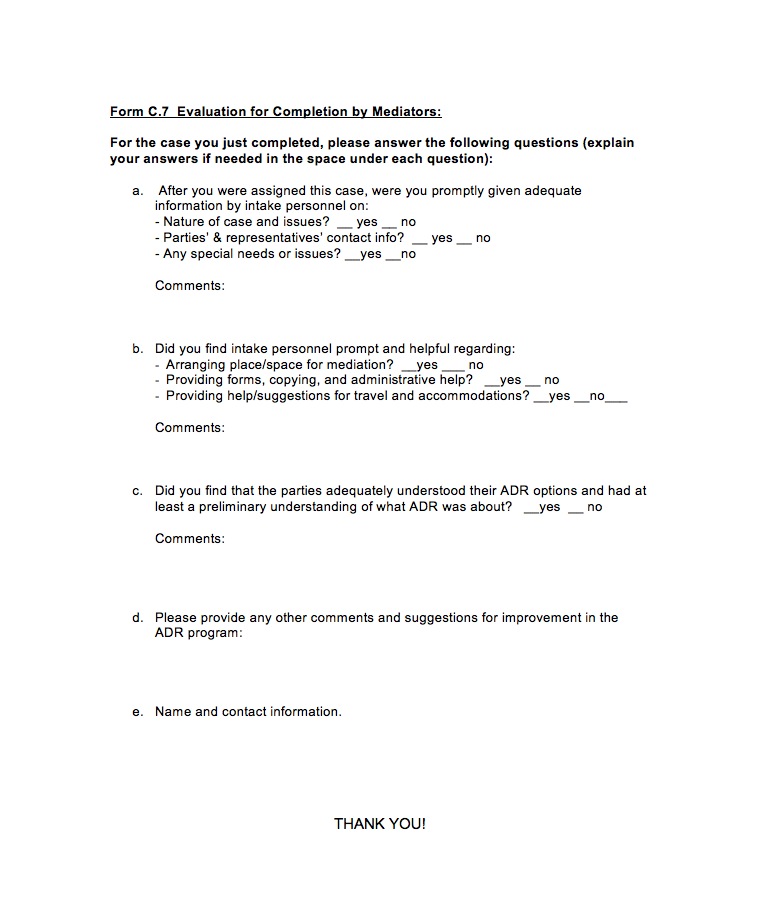
Form C-8
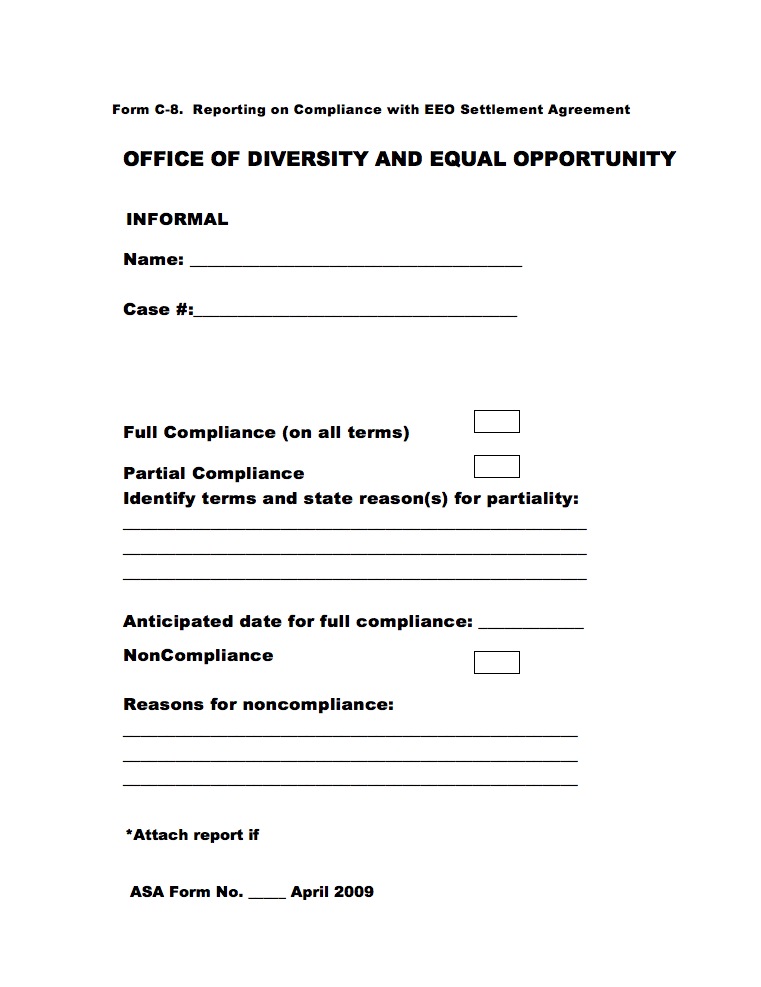
Form C-9
